286 scholarly books by Haus Publishing and 9
start with F
286 scholarly books by Haus Publishing and 9
286 scholarly books by Haus Publishing
9 start with F start with F
9 start with F start with F

Feeding the Planet
Environmental Protection through Sustainable Agriculture
Klaus Hahlbrock
Haus Publishing, 2009
Almost a billion people all over the earth suffer from hunger and malnutrition. Many of them are starving while the world's population continues to grow dramatically. The population in the industrialized nations, whose hunger is still abundantly satisfied, must struggle with the costs of heavily subsidized overproduction of food. Still, the worldwide lack of food will also pose a threatening problem to them.
[more]

Fiction, Fact and Future
The Essence of EU Democracy
James Elles
Haus Publishing, 2019
Since its inception, the European Union has developed to become an open and transparent system which is democratically accountable to more than five hundred million European citizens. James Elles explains how the EU functions, emphasizing the emerging role of the European Parliament in the process. Elles reviews the history of Britain’s relationship with the EU and illustrates how a reluctance to consult the British people on multiple Treaty changes led to a lack of understanding about Brussels. Looking to the future, Elles assesses the global long-term trends that lie ahead to 2030 and underlines that closer European cooperation, for example on environmental and digital policies, will help them to be more easily resolved. As the next decade unfurls, the EU with President Macron at the forefront of the debate will progress and the European Parliament will continue to develop as a platform for the voice of the European people. From the disinterest of political leaders to the ambitions of emerging nations, Fiction, Fact and Future is not only a guide to why Britain failed to make the most of its EU membership, but also an optimistic message to a younger generation to help shape their future in the 21st century.
[more]
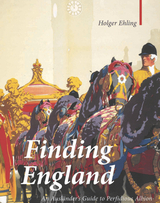
Finding England
An Auslander's Guide to Perfidious Albion
Holger Ehling
Haus Publishing, 2013
It is easy to find England on a map—it is part of that conspicuous thing in the North Sea, just off the French coast, and to the left of Denmark and Norway. It gets trickier once you are there: not even the English are keen to explain what England really is. Why do the English eat what they eat? Why do they do what they do? And why does the world think that England and Englishness is something to aspire to, something to adore? Holger Ehling takes us on a journey to iconic places, from London to Jarrow, from Stonehenge to Chipping Norton, from Shakespeare's Globe to the marvels of Blackpool, pondering along the way about history and everyday life and about what it is that makes these places and these people so quintessentially English and, therefore, different. We will meet royals and beggars, con-artists and real artists, heroes and villains, English roses and the legacy of the Empire Windrush. And perhaps, just perhaps—we will find England.
[more]

The Flight Across The Ice
The Escape of the East Prussian Horses
Patricia Clough
Haus Publishing, 2010
The moving and untold story of the Russian advance into East Prussia in 1945, and the fight for survival of a people and their way of life
[more]
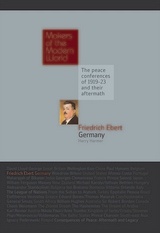
Friedrich Ebert
Germany
Harry Harmer
Haus Publishing, 2009
On 9 November 1918 Ebert became Imperial Chancellor as revolution broke out in Berlin. He opposed the radical left, declaring, 'Without democracy there is no freedom. Violence, no matter who is using it, is always reactionary', but he compromised Weimar democracy by his dependence on the army command and his use of the para-military Freikorps against the left. Ebert headed a joint SPD-USPD government until elections were held to a National Constituent Assembly in January 1919. Ebert became president of the new Weimar Republic (Germany's first democratically elected head of state) and retained office in a turbulent period in German politics. There were arguments among the Allies over how Germany should be treated, as France, Britain and the United States prioritised different objectives. In May 1919, the terms of the Treaty - on reparations, war guilt clause, loss of territories in Europe and colonies, limitations on armed forces - were presented to German representatives, precipitating opposition in government and the Armed Forces, and heated discussion in Cabinet. He continued as President until 1925, forced to confront the issues that arose from the Treaty and its political and economic consequences. After his death came the unravelling of the Treaty and the book examines how much of a part it played in creating the circumstances of the Second World War.
[more]
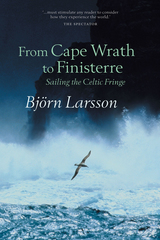
From Cape Wrath to Finisterre
Sailing the Celtic Fringe
Bjorn Larsson
Haus Publishing, 2005
From Cape Wrath to Finisterre is a travelogue and an homage to Celtic lands and waters, from their northern to their south western landfalls. Cape Wrath points towards the Arctic Circle at Scotland's furthest northerly limit. "Perhaps I was looking for a homeland, perhaps not, or at any rate a place where it would be worth trying to live for a while as well as one can for as long as it lasts." Finisterre, the furthest point in Galicia in northern Spain, was so named for being "The End of the Earth," Larsson's contemplative musings on life as seen from the cockpit and deck of his yacht enliven this journey from Denmark around Scotland, through the Irish Sea and onwards to Brittany and Spain. "Yes, I admit to rootlessness and impermanence," he admits. "But restlessness, on the other hand, is a scourge. It and its modern variant, stress, the futility of running round in circles, are to be avoided at all costs. It is far from certain, of course, that this way of life would suit everybody, but if it instils in someone the desire to experiment with alternatives. I shall be happy."
[more]
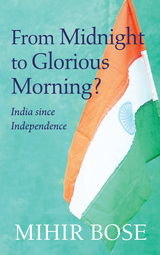
From Midnight to Glorious Morning?
India Since Independence
Mihir Bose
Haus Publishing, 2017
Mihir Bose was born in January 1947. Eight months later, India became a modern, free nation. The country he knew growing up in the 1960s has undergone vast and radical change. India today exports food, sends space probes to Mars, and, all too often, Indian businesses rescue their ailing competitors in the West.
In From Midnight to Glorious Morning?, Bose travels the length and breadth of India to explore how a country that many doubted would survive has been transformed into one capable of rivaling China as the world’s preeminent economic superpower. Multifarious challenges still continue to plague the country: although inequality and corruption are issues not unique to India, such a rapid ascent to global prominence creates a precarious position. However, as Bose outlines, this rapid ascent provides evidence that India is ever capable of making great strides in the face of great adversity.
Bose’s penetrating analysis of the last seventy years asks what is yet to be done for India in order to fulfill the destiny with which it has been imbued. The predictions of doom in August 1947 have proved to be unfounded; the growth of the nation in population and capital has been exponential, and there is much to celebrate. But Bose’s nuanced, personal, and trenchant book shows that it is naïve to pretend the hoped-for bright morning has yet dawned.
In From Midnight to Glorious Morning?, Bose travels the length and breadth of India to explore how a country that many doubted would survive has been transformed into one capable of rivaling China as the world’s preeminent economic superpower. Multifarious challenges still continue to plague the country: although inequality and corruption are issues not unique to India, such a rapid ascent to global prominence creates a precarious position. However, as Bose outlines, this rapid ascent provides evidence that India is ever capable of making great strides in the face of great adversity.
Bose’s penetrating analysis of the last seventy years asks what is yet to be done for India in order to fulfill the destiny with which it has been imbued. The predictions of doom in August 1947 have proved to be unfounded; the growth of the nation in population and capital has been exponential, and there is much to celebrate. But Bose’s nuanced, personal, and trenchant book shows that it is naïve to pretend the hoped-for bright morning has yet dawned.
[more]
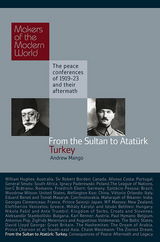
From the Sultan to Atatürk
Turkey
Andrew Mango
Haus Publishing, 2009
World War I sounded the death knell of empires. The forces of disintegration affected several empires simultaneously. To that extent they were impersonal. But prudent statesmen could delay the death of empires, rulers such as Emperor Franz Josef II of Austria-Hungary and the Ottoman Sultan Abdü'lhamid II. Adventurous rulers - Kaiser Wilhelm of Germany and Enver Pasha in the Ottoman Empire - hastened it. Enver's decision to enter the war on the side of Germany destroyed the Ottoman state. It may have been doomed in any case, but he was the agent of its doom. The last Sultan Mehmet VI Vahdettin thought he could salvage the Ottoman state in something like its old form. But Vahdettin and his ministers could not succeed because the victorious Allies had decided on the final partition of the Ottoman state. The chief proponent of partition was Lloyd George, heir to the Turcophobe tradition of British liberals, who fell under the spell of the Greek irredentist politician Venizelos. With these two in the lead, the Allies sought to impose partition on the Sultan's state. When the Sultan sent his emissaries to the Paris peace conference they could not win a reprieve. The Treaty of Sèvres which the Sultan's government signed put an end to Ottoman independence. The Treaty of Sèvres was not ratified. Turkish nationalists, with military officers in the lead, defied the Allies, who promptly broke ranks, each one trying to win concessions for himself at the expense of the others. Mustafa Kemal emerged as the leader of the military resistance. Diplomacy allowed Mustafa Kemal to isolate his people's enemies: Greek and Armenian irredentists. Having done so, he defeated them by force of arms. In effect, the defeat of the Ottoman empire in the First World War was followed by the Turks' victory in two separate wars: a brief military campaign against the Armenians and a long one against the Greeks. Lausanne—where General Ismet succeeded in securing peace on Turkey's terms—was the founding charter of the modern Turkish nation state. But more than that it showed that empires could no longer rule peoples against their wishes. This need not be disastrous: Mustafa Kemal demonstrated that the interests of developed countries were compatible with those of developing ones. He fought the West in order to become like it. Where his domestic critics wanted to go on defying the West, Mustafa Kemal saw that his country could fare best in cooperation with the West.
[more]

The Funerals
A Novel of the Algerian Civil War
Rashid Boudjedra
Haus Publishing, 2015
Algiers, 1955. It is in the midst of civil war, and we meet Sarah, who joins an anti-terrorism unit. There, she meets Salim, a forensic scientist. They embark on a passionate affair, facing the horror of terrorist attacks alongside their own wild impulses. Together, they learn who is to blame for the carnage at a local school. The perpetrators are the same people who tore an eleven-year-old girl from her class before beating, raping, and killing her. The assassins even dare to attend the funeral of a boy shot in the school’s courtyard while he was cleaning the blackboard. But as Sarah and Salim discover, none in the community are willing to speak out or denounce the killers, as doing so would only put their own lives at risk.
Full of suspense and drama, The Funerals takes readers behind the madness of civil war and shows how in times like these, some might attack their victims to feel a little less alone—perhaps even a little more human.
Full of suspense and drama, The Funerals takes readers behind the madness of civil war and shows how in times like these, some might attack their victims to feel a little less alone—perhaps even a little more human.
[more]
READERS
Browse our collection.
PUBLISHERS
See BiblioVault's publisher services.
STUDENT SERVICES
Files for college accessibility offices.
UChicago Accessibility Resources
home | accessibility | search | about | contact us
BiblioVault ® 2001 - 2024
The University of Chicago Press









